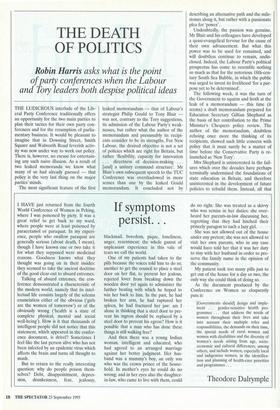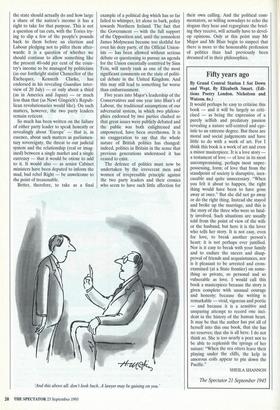THE DEATH OF POLITICS
Robin Harris asks what is the point
of party conferences when the Labour and Tory leaders both despise political ideas
THE LUDICROUS interlude of the Lib- eral Party Conference traditionally offers an opportunity for the two main parties to plan their tactics for their own party con- ferences and for the resumption of parlia- mentary business. It would be pleasant to imagine that in Downing Street, Smith Square and Walworth Road feverish activ- ity was now under way to work out policy. There is, however, no excuse for entertain- ing any such naive illusion. As a result of two leaked memoranda we know what many of us had already guessed — that policy is the very last thing on the major parties' minds.
The most significant feature of the first leaked memorandum — that of Labour's strategist Philip Gould to Tony Blair was not, contrary to the Tory suggestions, its admission of the Labour Party's weak- nesses, but rather what the author of the memorandum and presumably its recipi- ents consider to be its strengths. For New Labour, the desired objective is not a set of policies which are right for Britain, but rather 'flexibility, capacity for innovation . . . directness of decision-making . . . [and] a unitary command structure'. Mr Blair's own subsequent speech to the TUC Conference was overshadowed in more senses than one by the leaked Gould memorandum. It concluded not by describing an alternative path and the mile- stones along it, but rather with a passionate plea for 'power'.
Undoubtedly, the passion was genuine. Mr Blair and his colleagues have developed a quasi-evangelical fervour for the cause of their own advancement. But what this power was to be used for remained, and will doubtless continue to remain, undis- closed. Indeed, the Labour Party's political prospectus has come to resemble nothing so much as that for the notorious 18th-cen- tury South Sea Bubble, in which the public was urged to invest its livelihood 'for a pur- pose yet to be determined'.
The following week, it was the turn of the Government to squirm and froth at the leak of a memorandum — this time (it seems) a draft memorandum prepared for Education Secretary Gillian Shephard as the basis of her contribution to the Prime Minister's Chequers policy review. The author of the memorandum, dotibtless echoing once more the thinking of its recipients, showed such little concern with policy that it must surely be a matter of time before the Conservative Party is re- launched as 'New Tory'.
Mrs Shephard is uninterested in the fail- ures which over the decades have perhaps terminally undermined the foundations of state education in Britain, and therefore uninterested in the development of future policies to rebuild them. Instead, all that Mrs Shephard and her alter ego can sug- gest is what Labour also suggests — that the taxpayer should stump up more money to preserve the system, and do so for the engagingly cynical reason that (in the words of the memorandum) the Govern- ment is 'politically exposed'.
It would, of course, be absurd to bridle at politicians and their advisers in the two main parties taking care about the presen- tation of their policies. What is of impor- tance, and should be of concern, however, is where the politics of presentation rather than the politics of policy leaves British parliamentary democracy. It is not, after all, as if there is any lack of issues of weight to concern our political masters.
There is the not so small matter of what the state should actually do and how large a share of the nation's income it has a right to take for that purpose. This is not a question of tax cuts, with the Tories try- ing to slip a few of the people's pounds back to them before an election and Labour pledging not to pilfer them after- wards: it is a question of whether we should continue to allow something like the present 40-odd per cent of the coun- try's income to be managed by politicians (as our forthright statist Chancellor of the Exchequer, Kenneth Clarke, has endorsed in his revealing Guardian inter- view of 20 July) — or only about a third (as in America and Japan) — or much less than that (as Newt Gingrich's Repub- lican revolutionaries would like). On such matters, however, the two party leaders remain reticent.
So much has been written on the failure of either party leader to speak honestly or revealingly about 'Europe' — that is, in essence, about such matters as parliamen- tary sovereignty, the threat to our judicial system and the relationship (real or imag- ined) between a single market and a single currency — that it would be otiose to add to it. It would also — as senior Cabinet ministers have been deputed to inform the mad, bad rebel Right — be unwelcome to the point of treasonable.
Better, therefore, to take as a final example of a political dog which has so far failed to whimper, let alone to bark, policy towards Northern Ireland. The fact that the Government — with the full support of the Opposition and, until the somnolent James Molyneaux became too slothful for even his dozy party, of the Official Union- ists — has been allowed without serious debate or questioning to pursue an agenda for the Union essentially contrived by Sinn Fein, will surely rank as one of the most significant comments on the state of politi- cal debate in the United Kingdom. And this may still lead to something far worse than embarrassment.
Five years into Major's leadership of the Conservatives and one year into Blair's of Labour, the traditional assumptions of our adversarial system, in which two philoso- phies endorsed by two parties clashed so that great issues were publicly debated and the public was both enlightened and empowered, have been overthrown. It is no exaggeration to say that the whole nature of British politics has changed: indeed, politics in Britain in the sense that previous generations understood it has ceased to exist.
The defence of politics must now be undertaken by the irreverent men and women of irrepressible principle against the two party leaders and their cronies who seem to have such little affection for `And this above all: don't look back. A lawyer may be gaining on you.' their own calling. And the political com- mentators, so willing nowadays to echo the slogans they hear and regurgitate the brief- ing they receive, will actually have to devel- op opinions. Only at this point may Mr Major and Mr Blair begin to suspect that there is more to the honourable profession of politics than had previously been dreamed of in their philosophies.




































































 Previous page
Previous page